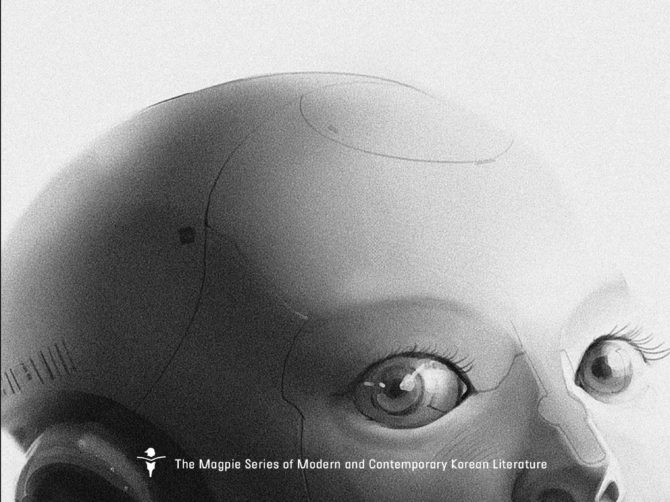Congratulations to Kim Bo-Young, author of On the Origin of Species and Other Stories, on being longlisted for the 2021 National Book Award for Translated Literature! The award is shared with the main translators of the stories in the book: Sora Kim Russell and Joungmin Lee Comfort. We’d also like to recognize Gord Sellar and Jihyun Park, who translated the story “Evolutionary Myth”, and Eunjae Jo and Melissa Chan who translated the story “Between Zero and One.” And of course, huge congrats to Dr. Sunyoung Park and Sunyoung Lee, the co-editors and visionaries behind the Kaya Press Magpie Series in Global Korean Literature in Translation.
Published in May 2021 as Kim’s debut English-language collection, On the Origin of Species and Other Stories has since received recognition for its unique, unconventional, and exciting re-imagination of popular science fiction and fantasy themes. It is the first Korean science fiction collection to be recognized by the National Book Foundation.
To learn more about Kim Bo-Young’s imagination and writing process, continue reading for an exclusive Q&A featuring her translated answers.
…
On the Origin of Species opens with a thought-provoking essay on the categorization of “science fiction.” How do you see your work’s relationship to genre, if at all?
It’s hard for me to say. Honestly, even when I try to write something non-SF, it ends up being read as SF. Because my writing is going to be interpreted as such anyway, all I can do is continue to write what I feel is right for myself.
What are some books and/or films that have influenced you and your work? Any writers?
I love so many things, all the excellent creators in the world and my life itself, of course, influencing me. But I can’t say that I know how these interconnected elements have changed me. Recently, I did enjoy Zack Snyder’s Justice League—it was as if gods were descending on the screen.
Can you speak a little about your writing process, especially in this exceptional year? Was COVID-19 an inspiration, a bother, or both?
Coronavirus hasn’t changed my process or lifestyle very much. I’m very lucky because I live in a rural area, distant from cities in Korea, and it may be one of the safest places on Earth. I do have more friends visiting me now in their attempts to escape the virus. However, because many have suffered from this disaster, with so many casualties all over the world, it is difficult for me to comment.
Many characters in On the Origin of Species push against pre-established norms in each of their respective worlds. Why was it important for you to write about challenging these norms, such as South Korea’s education system in “Between Zero and One” or perceptions of illness in “Stars Shine in Earth’s Sky”?
I have often been told that I use defamiliarization a lot, but I’m just writing based on what I see in the world. The world has always been strange to me, but it’s difficult to explain that strangeness clearly in everyday language. However, the techniques of the novel, and the techniques of SF in particular, make this difficult task possible. I didn’t have specific intentions for “Between Zero and One” and “Stars Shine in Earth’s Sky”—I just created them from some slices of my life. Experiences don’t have intentions; they’re only facts. However, someone’s experiences or facts can be read as a special message. When I think about it, I’m gradually filling the gap between the world and me through my writing, getting closer and closer to closing it.
Evolution and the idea of being “human” are recurring themes in several of your stories in this collection. How do these ideas play a role in your work?
If you found evolution repeated in this collection, then it may be due to the preference of the editor. Perhaps different ideas will be revealed in my other collections. Honestly, after finishing up with a particular idea in my writing, that topic is no longer my concern. Maybe I write to let the fixation go.
A lot of popular science fiction media involves a plot where human civilization encounters some sort of difference or the “Other.” Many of your stories do the unexpected opposite, with nonhuman protagonists wrestling with ideas that we deem natural. Can you speak a little about this perspective shift, and why you chose to employ it in your work?
What I have always found mysterious or incomprehensible are the things and people around me. How can people take such strange things for granted? For instance, in the world of “Between Zero and One,” teachers tell kids that so long as they get into a good college, it shouldn’t matter if they lose their human rights in the process, and they should take advantage of this system. Imagine learning this in class. How on earth am I supposed to accept this reality? Reality is full of absurdities, and in order to understand reality, I try imagining it from an outsider’s perspective, hoping I can share this strangeness with others through this lens. After I finish a story, I feel myself get a little closer to understanding, too.


Leave a Comment
We'd love to know what you think.